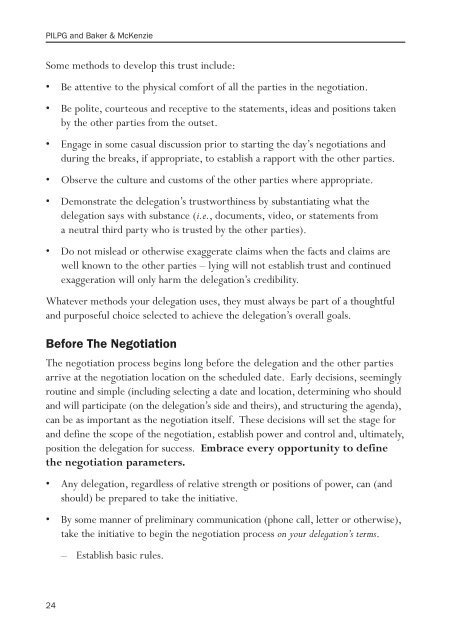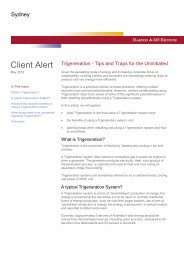The International Negotiations Handbook - Baker & McKenzie
The International Negotiations Handbook - Baker & McKenzie
The International Negotiations Handbook - Baker & McKenzie
Create successful ePaper yourself
Turn your PDF publications into a flip-book with our unique Google optimized e-Paper software.
PILPG and <strong>Baker</strong> & <strong>McKenzie</strong><br />
Some methods to develop this trust include:<br />
• Be attentive to the physical comfort of all the parties in the negotiation.<br />
• Be polite, courteous and receptive to the statements, ideas and positions taken<br />
by the other parties from the outset.<br />
• Engage in some casual discussion prior to starting the day’s negotiations and<br />
during the breaks, if appropriate, to establish a rapport with the other parties.<br />
• Observe the culture and customs of the other parties where appropriate.<br />
• Demonstrate the delegation’s trustworthiness by substantiating what the<br />
delegation says with substance (i.e., documents, video, or statements from<br />
a neutral third party who is trusted by the other parties).<br />
• Do not mislead or otherwise exaggerate claims when the facts and claims are<br />
well known to the other parties – lying will not establish trust and continued<br />
exaggeration will only harm the delegation’s credibility.<br />
Whatever methods your delegation uses, they must always be part of a thoughtful<br />
and purposeful choice selected to achieve the delegation’s overall goals.<br />
Before <strong>The</strong> Negotiation<br />
<strong>The</strong> negotiation process begins long before the delegation and the other parties<br />
arrive at the negotiation location on the scheduled date. Early decisions, seemingly<br />
routine and simple (including selecting a date and location, determining who should<br />
and will participate (on the delegation’s side and theirs), and structuring the agenda),<br />
can be as important as the negotiation itself. <strong>The</strong>se decisions will set the stage for<br />
and define the scope of the negotiation, establish power and control and, ultimately,<br />
position the delegation for success. Embrace every opportunity to define<br />
the negotiation parameters.<br />
• Any delegation, regardless of relative strength or positions of power, can (and<br />
should) be prepared to take the initiative.<br />
• By some manner of preliminary communication (phone call, letter or otherwise),<br />
take the initiative to begin the negotiation process on your delegation’s terms.<br />
24<br />
– Establish basic rules.

















